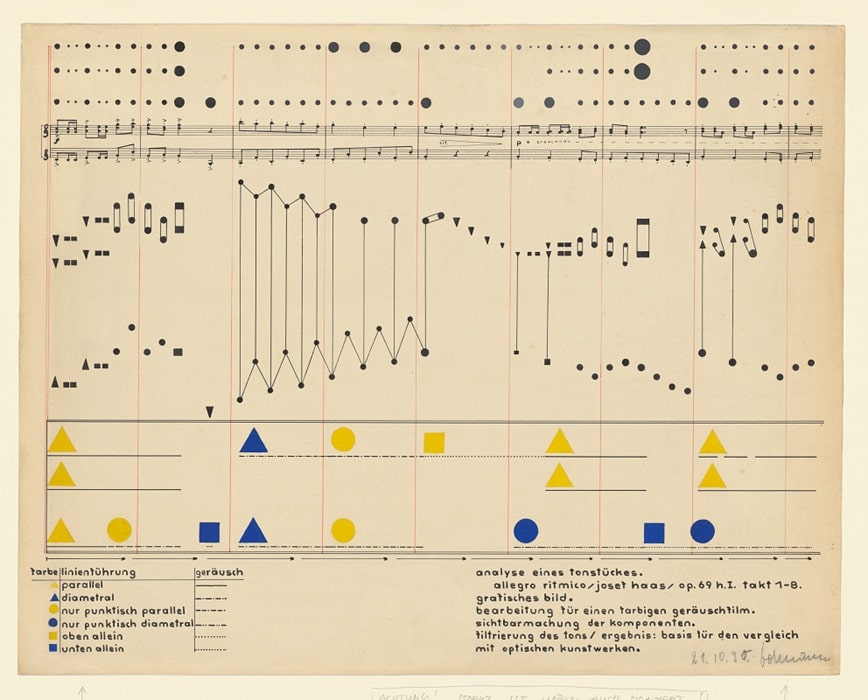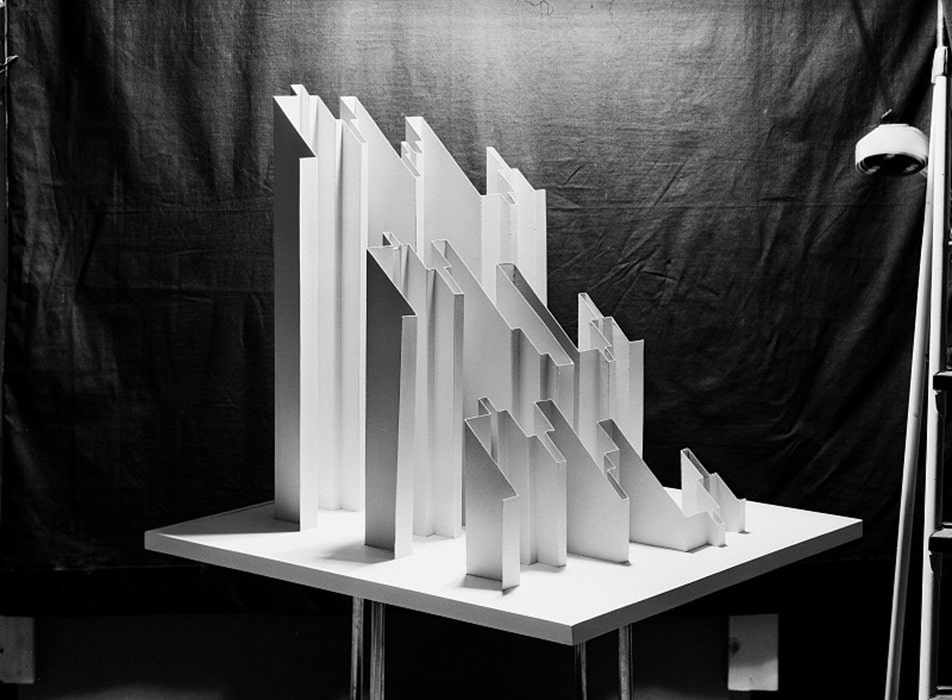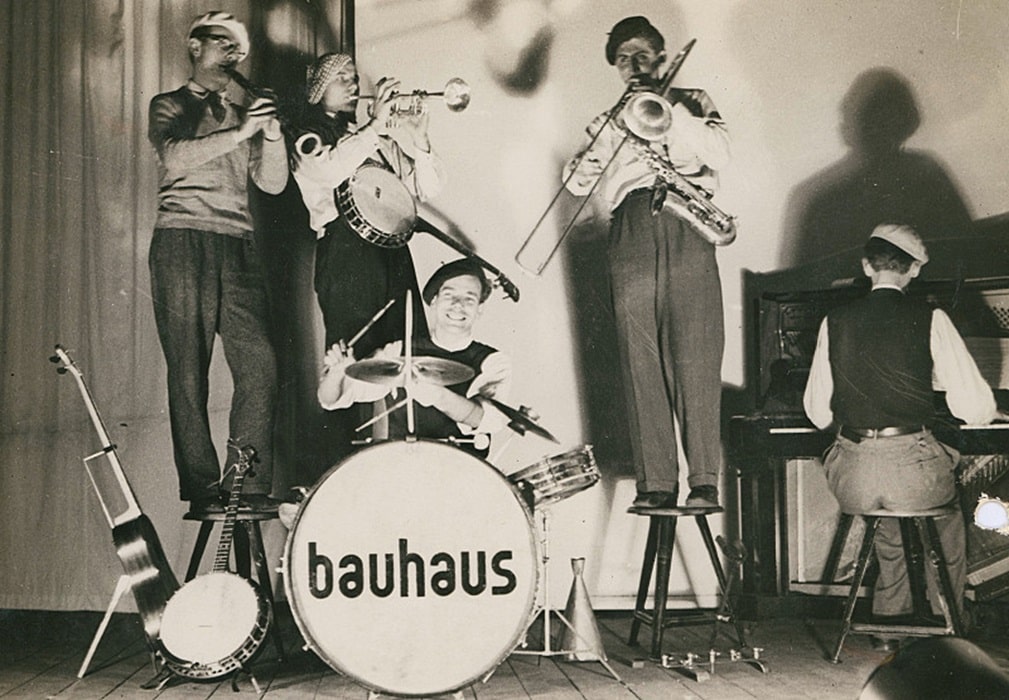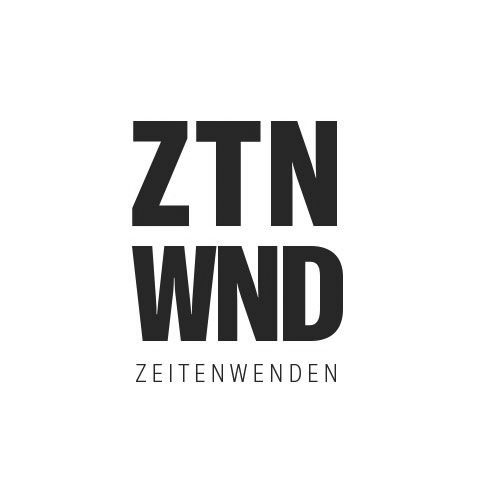Bauhaus Music 2024 will take place from 17 October to 19 October 2024. It will be organised at two locations: the temporary bauhaus-archiv and St. Elisabeth + Villa Elisabeth.
Image above: Bauhaus band, 1930, Bauhaus-Archiv Berlin
“I felt released, freed”, said the composer Ruth Crawford Seeger about her visit to the Bauhaus Dessau in 1931. Freedom – “Bauhaus Music 2024” is dedicated to this highly topical subject. With a focus on exile, the three-day festival explores the artistic and political attitudes or forms of expression from then until today. Works by Arnold Schönberg, Kurt Schwitters, Johann Sebastian Bach, Béla Bartók, Alban Berg, Stefan Wolpe, Cathy Milliken and Ruth Crawford Seeger, among others, can be heard in moderated concerts. Numerous artists, including the well-known soloists Claudia Barainsky, Kolja Blacher, Gunnar Brandt-Sigurdsson and Jocelyn B. Smith, and the Deutsches Kammerorchester Berlin will come together over three days to trace the musical life and work of the Bauhaus.
“Bauhaus Music 2024” is part of an interdisciplinary research project at the Bauhaus-Archiv / Museum für Gestaltung, which has been investigating the connection between Bauhaus and music since 2021.
Marc Blitzstein, Cathy Milliken, Jocelyn B. Smith
Lunch concert, Thursday, October 17, 2024, 12:30 – 1:30 pm, the temporary bauhaus-archiv (free of charge, with registration)
Event language: German
The festival begins with a sensational find: the avant-garde opera “Parabola and Circula” by US composer Marc Blitzstein, written in 1929/30, was discovered in the course of research into musical life at the Bauhaus. It was to be premiered at the Dessau Theater, but this never happened. For the opening of “Bauhaus Music” at the temporary bauhaus-archiv, excerpts from it can now be heard for the first time. Inspired by Blitzstein’s preoccupation with constructivist art, “Parabola and Circula” tells of a romance between rectangle and dot with numerous other geometric figures. Alongside Kurt Weill, Marc Blitzstein is considered one of the most important composers of anti-capitalist and anti-fascist theater.
The radio play “Driving with Fatima” by composer Cathy Milliken from 2017 brings the listener into the South African present. It is dedicated to the author Fatima Dike, who grew up in the township of Langa, where she still lives today. On a journey through Langa, she tells stories of home and exile, modernity and tradition, which Cathy Milliken has woven into a radio play. The singer Jocelyn B. Smith took over the vocal part and can be heard live at the lunch concert with songs from “Driving with Fatima”.

Béla Bartók, Alban Berg, Johann Sebastian Bach
Friday, October 18, 2024, 7:30 – 9 pm, St. Elisabeth (advance ticket sales)
Event language: German
On Friday evening, pieces by Alban Berg and Béla Bartók meet Johann Sebastian Bach’s Brandenburg Concerto No. 3, presented by the German Chamber Orchestra in St. Elisabeth’s Church.
Both Alban Berg and Béla Bartók were in contact with numerous Bauhaus members and were regular guests at the Bauhaus. They were part of musical modernism, which broke away from the prevailing rules and proclaimed the equality and “liberation” of all sounds. Similar to the Bauhaus in the field of design, the composers no longer accepted traditional certainties in music either.
In apparent contrast to this is the form-bound music of Johann Sebastian Bach, who was, however, an important point of reference for many Bauhaus members and the musical avant-garde. It was precisely the strict form of the fugue, of which Bach was considered the master, that the avant-garde found liberating.
Stefan Wolpe, Arnold Schönberg, Kurt Schwitters, Ruth Crawford Seeger
Moderated concert “Stefan Wolpe in portrait”
Saturday, October 19, 2024, 3 – 5 pm, Villa Elisabeth (free of charge, with registration)
Event language: German and English

Concert with pieces by Kurt Schwitters, Arnold Schönberg, Ruth Crawford Seeger
Saturday, October 19, 2024, 6:30 – 8 pm, Villa Elisabeth (advance ticket sales)
Event language: German
Many artists and musicians around the Bauhaus were persecuted by the National Socialists and had to flee, including the Bauhaus member and composer Stefan Wolpe. Saturday afternoon is dedicated to his work. A moderated concert in the Villa Elisabeth will trace the stages of his life – from the Weimar Republic to Israel and the USA – and show how his early experiences at the Bauhaus shaped his path as a composer and teacher.
Arnold Schönberg, a prominent protagonist of New Music, also fled into exile in America. His melodrama “Pierrot lunaire” was produced by the Bauhaus in Weimar in 1922. The atonal music and innovative Sprechgesang of the piece made it a key work of musical modernism. For “Bauhaus Music” it is interpreted by Claudia Barainsky.
Kurt Schwitters also worked with new linguistic means, but much more radically, in his “Ursonate”. The sound poem, written between 1923 and 1932, reduces language to individual sounds and blurs the boundary between music and poetry. Schwitters also performed the “Ursonate” during one of his guest appearances at the Bauhaus. On Saturday evening, Gunnar Brandt-Sigurdsson will recite excerpts from the Dada poem.
Ruth Crawford Seeger’s “Music for Small Orchestra” completes the evening with a piece from the American avant-garde. This study of timbre and atmosphere is one of the few works by this radically modern composer who, after initial success, withdrew creatively and devoted herself to researching folk music. “Music for Small Orchestra” was composed shortly before Seeger’s visit to the Bauhaus in Dessau, which she found particularly liberating and which inspired the festival motto of ‘Bauhaus Music’: Freedom.
Festival finale with the Bauhaus band
Jazz and bebop at the Bauhaus
Saturday, October 19, 2024, 8:30 – 9:30 pm, Villa Elisabeth (free of charge, with registration)

To round off the festival, the Bauhaus-Kapelle, which is based on a historical model and comes together especially for “Bauhaus Music”, will perform. Under the direction of Karl-Heinz Steffens, there will be danceable jazz and bebop, inspired by Stefan Wolpe and his many connections to the New York music scene of the 1940s and 1950s. Later jazz greats such as Gil Evans and John Carisi were among his students. Wolpe also founded the “Contemporary Music School”, where composition was taught in the style of Bauhaus pedagogy.
Workshops with pupils
In the run-up to the festival, various workshops will be held with schoolchildren: For example, composer Cathy Milliken invites pupils to tell their stories and make them audible using simple means. In another project, the artists Alexandre Decoupigny and Claire Fristot approach the principles of the Bauhaus using compositional means with an 11th grade class from the Carl-von-Ossietzky-Gemeinschaftsschule. Here too, the focus is on music and the relationship to the reality of the young people’s lives. The results of the various projects will be presented as part of the festival.
Artistic directors of “Bauhaus Music 2024”: Kai Hinrich Müller, Michal Friedländer and Karl-Heinz Steffens
“Bauhaus Music 2024” is made possible by the Hauptstadtkulturfonds.
WHEN?
Festival dates: Tuesday, October 17 – Thursday, October 19, 2024
Opening hours:
the temporary bauhaus-archiv: Monday – Saturday, 10 am – 6 pm
St. Elisabeth + Villa Elisabeth: Monday – Thursday, 10 am – 3 pm
WHERE?
the temporary bauhaus-archiv
Knesebeckstraße 1
10623 Berlin-Charlottenburg
St. Elisabeth + Villa Elisabeth
Invalidenstraße 3
10115 Berlin-Mitte
COSTS?
Tickets in advance via https://www.eventbrite.com/cc/bauhaus-music-2024-3374499
Advance booking until August 31, 2024: 15 EUR / 7 EUR (reduced), plus fees
Advance sale from September 1 to October 19, 2024: EUR 20 / EUR 10 (reduced), plus fees
Box office on site: 20 EUR / 10 EUR (reduced)






